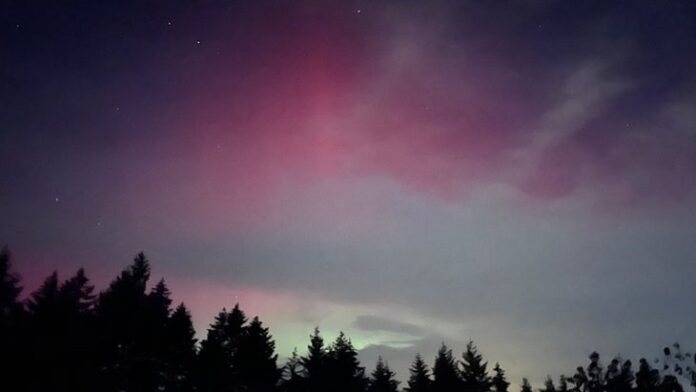“], “filter”: { “nextExceptions”: “img, blockquote, div”, “nextContainsExceptions”: “img, blockquote, a.btn, a.o-button”} }”>
Heading out the door? Read this article on the new Outside+ app available now on iOS devices for members!
>”,”name”:”in-content-cta”,”type”:”link”}}”>Download the app.
I’ve always wanted to see the northern lights.
This isn’t a unique desire. The northern lights are far less normalized than the celestial events we enjoy every day— the sun, the moon, the stars—so it makes sense that they’re a novelty most want to encounter. They’re a reminder that we live in space, a reality that didn’t always sit well with me. I have always adored Earth and her flowing rivers and forests and flowers and dirt and waves and rainstorms. But space? The concept seemed cold and distant.
But by my early 20s, I had made it my mission to learn to love outer space. I read up on quantum mechanics and string theory, strived to comprehend Saturn’s rings, and mastered the phases of the moon. Astrology became less about generalized personality traits and more about the movements of planetary bodies. Along with my logical learnings, the northern lights offered a bridge of understanding. The mystical light show made outer space feel safer, somehow, imbued with the same sort of mystery and magic that informs my passion for the natural world.
In Philip Pullman’s His Dark Materials trilogy, the author imagines the aurora borealis as a veil between worlds. And so it was for me.
My imaginings of the aurora borealis take on more light, color, and life with each new piece of information. Did you know, for example, that the northern lights emit sounds? Some say they they crackles when you’re standing directly beneath them. Are you aware that the swirling, mystical hues are caused by solar winds entering our atmosphere? And that there are also southern lights, known as the aurora australis?
So, in celebration of my 30th birthday, I stayed up late researching and planning a solo trip to Alaska to bask in the aurora. The idea was to fly into Fairbanks, alone in February, and drive for five hours through the snow to a resort where I would have a better chance of experiencing the event than I ever would in the lower 48.
But the more I thought about the journey, the more daunting it became, even for an experienced solo traveler like me. I scrapped the plan and went to Kauai instead. I rationalized this decision by telling myself the northern lights are a gift reserved for a select and privileged set: those who made their homes in remote, frozen places, those who were willing to get themselves there (despite the risk of disappointment), and the supremely lucky. This was a bucket list item, a rarity, a daydream that most would never experience.
Until this year.
When the aurora began showing up in everyone’s backyard, I was filled with an envy as green as the spectacle’s signature hue. While some may have been prepared for this event, it came as a complete surprise to me. I slept through its first instance on the West Coast, waking up to an Instagram feed filled with ribbons of saturated, colorful light. The next few rounds missed my state entirely.
As the aurora made itself available to more and more people, I found myself wondering if this new reality lessened its majesty or enhanced it. The increase in sightings has to do with the sun’s solar cycle. According to NASA, the National Oceanic and Atmospheric Administration (NOAA), and the Solar Cycle Prediction Panel, the sun is currently at the peak of its 11-year cycle. This “solar maximum” comes in with an increase in solar activity and “space weather,” resulting in what could be the most vibrant display of the northern lights on record in the last 500 years.
When placed in its proper perspective, this broadened access to the aurora becomes a gift of literally unparalleled proportions.
Earlier this month, I opened Instagram one night to find that a nearby friend had posted a picture of the lights. I checked the news, buzzing with anticipation. Yes, there was a solar storm, and the northern lights would be visible from Alabama to California. I rushed outside and stared at the deceptively dark night sky. There was nothing, but I could feel something in the air. Keeping in mind that the cameras on our phones can occasionally capture things we can’t, I snapped photos in every direction.
Above the tree line in the photos, fuchsia, lavender, aquamarine, and navy blue swirled through each frame. It was admittedly anticlimactic. There was no intentional journey to some frozen tundra, no crackle, no dance. Still, the knowledge that the northern lights hovered over my head satisfied a portion of my desire. I stood outside in the crisp night air for an hour, imagining the colors ebbing and flowing overhead.
We live in a slice of time in which the sky is putting on a show for us all. Suddenly, the magic of the aurora isn’t in its rarity, but in its familiarity. Taking chances, setting out on new adventures, and orchestrating trips to far-flung destinations is part of what makes life so fun—the unexpected, the foreign. But welcoming moments of true fascination right where you are? That’s the real journey of being human.
Even after standing below them, I still don’t feel like I’ve seen the northern lights. But I understand that this witnessing is less about urgency and need and more about patience and allowing. I’m going to let them come to me.










